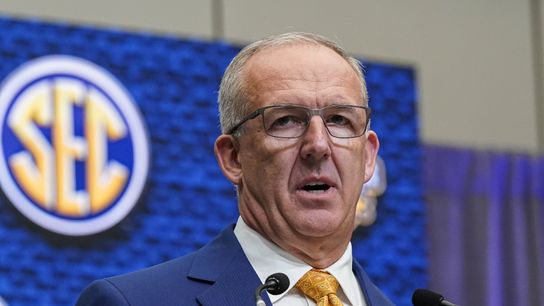Greg Sankey has mediated verbal spats emanating from Name, Image and Likeness chatter from two of the Southeastern Conference's -- and college football's -- most prominent coaches in Alabama's Nick Saban and Texas A&M's Jimbo Fisher; Sankey likewise has trekked to Washington, D.C., to discuss the nebulous system with government leaders.
Monday, as he helped kick off the SEC's annual media days gathering being hosted for the first time in Nashville, Tennessee, Sankey steadfastly proclaimed "the need for a national standard" for oversight of NIL matters.
"What seems to have happened is there's been overly broad language," said Sankey, whose pact was just extended to continue his reign atop the SEC. "When we were here (in Nashville at the SEC Men's Basketball Tournament) with our presidents in March we identified potential strategies for conference regulation of name, image, and likeness. ...
"We're all going to be confronted, whether at the national level or the conference level, how do we want this to be overseen. You've heard me state the concerns, and I've shared those since legislation has been adopted.
"So this is an ongoing problem that we identified as the exact wrong way to go about permitting student-athletes to engage in name, image, and likeness activity.
"It is a current circumstance, and you heard me observe that it speaks to the need for a national standard."
While Sankey declined to delve into the "minutiae" of potential NIL reform, he did echo the concerns of what numerous college football coaches, player personnel directors and other athletics staffers have expressed to FootballScoop: who has the power of roster assembly.
As collectives -- which saw seven of college athletics's largest entities including the likes of Georgia's Classic City Collective, Michigan's Champions Circle and Tennessee's Spyre form what Sankey termed a "collection of collectives -- dole out endorsement deals for student-athletes, pressure from both external and internal factors can become a real issue, Sankey explained.
"Let me be specific about the concerns: One of the concerns that I've been public about this is transferring control at an institutional level of rosters, who's on a roster, pressure on playing time from coaches, and then up the chain of command to athletics directors and presidents or chancellors to an outside entity," Sankey said, with outside entity in this instance being a potential collective group.
"People have opined about booster influence, but with collective activity about which we've read, I think it magnifies that concern, who's really in charge.
"So that informs the talking point. I have read with interest on this formation of a collective association or a collective, I guess, a collection of collectives. And William King, our associate commissioner for legal affairs, has reached out to some just to have a conversation to learn more. We have to be in a constant learning mode. We want to exercise care. We want to do that in collaboration with our campuses."
While Sankey spent most of his opening remarks on NIL elements, he reiterated the SEC's focus is on getting to 16 teams a year from now when both Oklahoma and Texas are formally folded into the conference.
"My view is we know who we are; we're comfortable as a league," Sankey said. "We're focused on our growth to 16. We've restored rivalries. We're geographically contiguous with the right kind of philosophical alignment, and we can stay at that level of super conference.
"When you go bigger, there are a whole other set of factors that have to be considered, and I'm not sure I've seen those teased out other than in my mind late at night."
